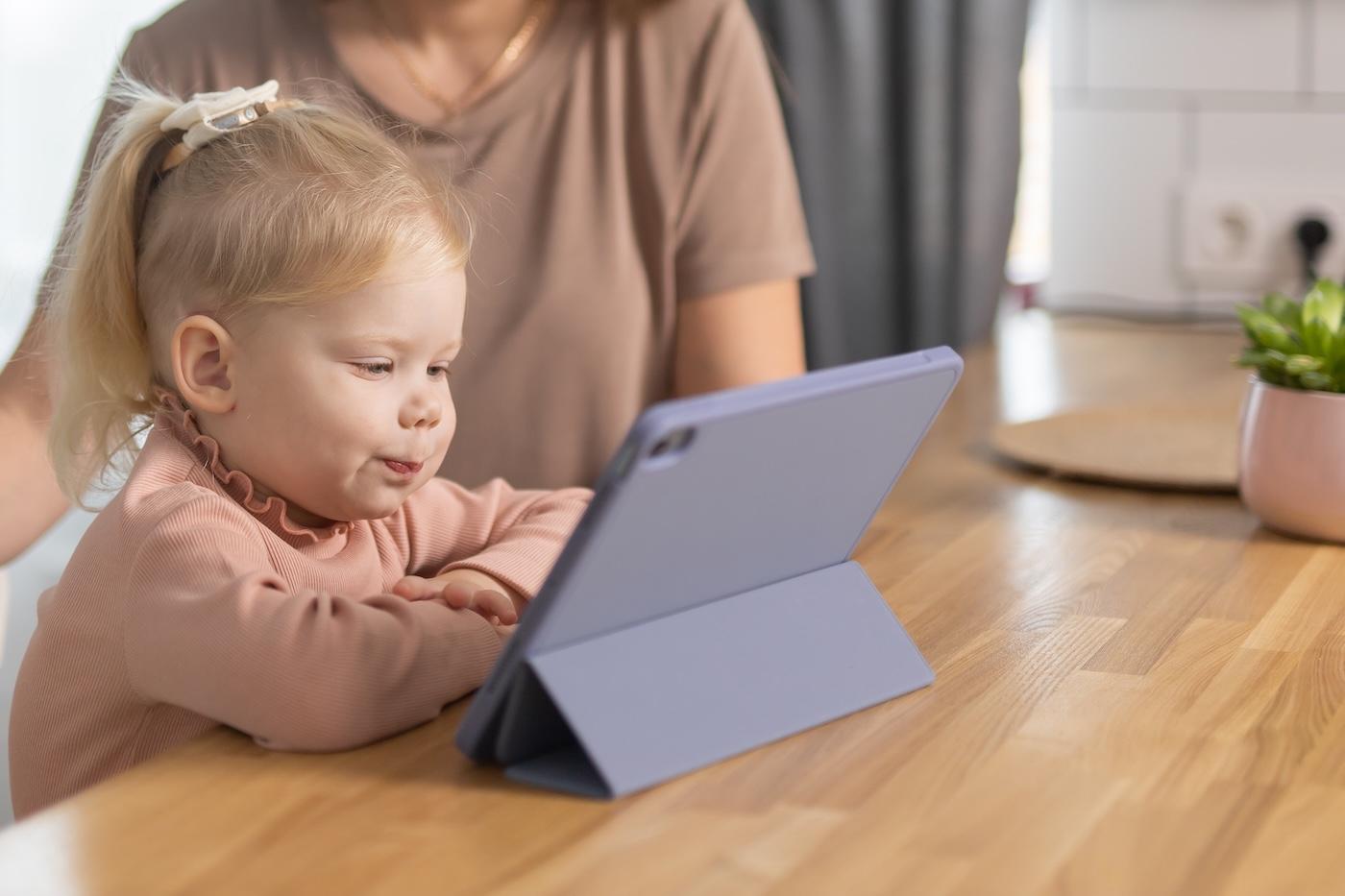TODDLER
What to Know About Bellyaches
Here’s a gut-check on kids’ tummy troubles.

Written by
Dr. Harvey Karp

As soon as little ones utter the words “My tummy hurts,” parents and caregivers everywhere grab their detective caps and start investigating. Where does it hurt? When do you last poo? Does it feel like a balloon or a butterfly? If you need expert help deciphering the clues and solving the case, never fear! Here’s everything you need to know about children’s stomach aches.
Pinpoint the Cause of Your Child’s Stomach Pain
Since it can be tricky for kids to articulate exactly what the pain feels like, it’s a good idea to ask them to point to where it hurts. This can give you a clue to what the problem might be. For example, if your tot points to their upper abdomen, they might be dealing with a stomach bug or indigestion. And if your bub points low on their belly (aka colon territory), they could have a urinary tract infection or constipation. And vague “wiggly” butterfly-like belly pain in a child’s tummy can indicate nervousness or stress.
Most of the time, kids with stomach aches point to their belly button, which could be the sign of an upper or lower problem. Pain around the navel is usually gas or constipation—rarely a problem like gluten intolerance. Generally, pain around the navel is less worrisome than belly pain that’s further from the belly button. One exception: With appendicitis, pain starts by the belly button and usually moves to the lower right side of the tummy within a couple of hours.
Cause of Stomachaches by Pain Location
- Upper abdomen: stomach bug, food poisoning, indigestion
- Belly button: gas, stress, constipation, rarely gluten intolerance
- Lower abdomen: constipation or urinary tract infection
- Starts at belly button, moves to lower right side: appendicitis
Stomachache Causes in Children
There are lots of reasons your child may be experiencing belly pain…like gas, constipation, stress, and more. These are the top reasons your bub may have a shaky tummy.
Stomach Virus
Also called gastroenteritis or the stomach flu. This tummy trouble in kids is most often caused by rotavirus, but other viruses can be behind your kiddo’s illness, too, like norovirus. Children with a stomach bug often have tummy cramps and pass loose stools three or more times a day. (Learn more about norovirus.)
Constipation
Not eating enough fiber or drinking enough fluids can bring about constipation…so can holding in poop for too long. A big sign a child is constipated: fewer bowel movements than usual (less than every other day). And when constipated kiddos do poo, it’s hard, dry, and pellet-like or big “Lincoln logs.” Pooping can be painful, and children may also wet the bed. (Eating tips to relieve toddler constipation.)
Food Poisoning
Consuming something contaminated with bacteria, a virus, or another germ brings about food poisoning. Much like a stomach bug, cramps and frequent diarrhea are tell-tales. There may be vomiting as well. Symptoms start within an hour or two of consuming something contaminated.
Indigestion
Eating too much or too fast are the most common causes of indigestion in children. Your child may tell you that their upper belly hurts or burns. There may be nausea, bloating, and burping, too.
Gas
Carbonated and sugary drinks, fatty foods, cruciferous veggies and beans, using a straw, eating too fast, and constipation can all lead to gas. Beyond the usual toots and burps, gassy kids often feel pressure in their belly or bowels. (This feeding technique can help sidestep gas in babies.)
Stress
The neurotransmitters that control your child’s mood are the same ones that control pain and digestion, which is why nerves and stress can make a belly feel wiggly. Children will often describe a vague butterfly-like pain in the tummy.
Appendicitis
A blockage in the appendix lining can cause an infection, resulting in appendicitis. The big red flag: Pain moves from the belly button to the lower right side of the belly. There’s usually also fever, tenderness, lack of appetite, fast pulse, and listlessness. If you suspect appendicitis, immediately call your healthcare provider or head to the emergency room. (Ask your child to hop on one foot. If they hop once and suddenly have a sharp pain in the lower abdomen, that is often a sign of appendicitis.)
Stomachache Treatments and Relief
Stomachache relief depends on the cause! But here are some of my go-to treatments for children’s tummy aches:
- Try tea. If your little one is at least 6 months old, consider offering a comforting cup of cooled-off mint or chamomile tea to help reduce stomach spasms from gas and relieve stress bellies. (It’s a good idea to check with your child’s doctor first.)
- Give a belly rub. Tummy rubs can work wonders on nervous bellies, indigestion, gas, and constipation pain. Use your fingertips to “draw” an oval underneath your child’s belly button. Move your fingers clockwise, which follows your baby’s digestive tract. Next, walk your fingertips diagonally, making an X from one side of your bub’s belly to the other. Repeat as needed. (Learn more about baby massage.)
- Use a warm compress. Have your child lie down and rest and place a warm compress on their tum-tum. Try wetting a towel with very warm water, putting it in a freezer bag, and using that on the belly. (Put it on your forearm first to make sure it is not too hot!)
- Avoid meds. I don’t recommend reaching for any over-the-counter meds unless the pediatrician has advised something specific. Ibuprofen, for instance, does little for belly pain and may even further upset the stomach. And worse, the original Pepto-Bismol is unsafe for kids under 12 years old because it contains bismuth subsalicylate, which is a derivative of aspirin. Aspirin is off-limits for kids because it’s associated with Reye's syndrome, a scary brain disorder. (Find out more info on pain relievers for babies and toddlers.)
- Ask questions: Make sure to ask your child how things are going with their friends and any other new stresses, like moving to a new house, observing something frightening (a movie or domestic fight), a loss in the family, etc.
When to Call the Doctor About Stomachaches
Brief tummy aches are common in children and usually nothing serious. For help knowing when you call the doctor, follow your own gut…and this advice: If your tot’s tummy ache is severe—meaning your child is crying, cannot be distracted from the pain, or they’re showing other signs that they’re very uncomfortable—reach out to the doctor. It’s also smart to call the doctor if their tummy troubles go hand-in-hand with feeling listless, a high fever, vomiting, and/or if it lasts more than a couple of hours. And if your tot’s belly ache is mild, but lasts for over a week, contact your provider. Here’s some additional help knowing when to reach out to the pediatrician:
Stomachache plus...Cramps and/or severe diarrheaCould be…Food poisoning
Stomachache plus...Sore throat and/or feverCould be…Strep throat
Stomachache plus...Painful urinationCould be…Urinary tract infection
Stomachache plus...Cramps and/or diarrhea that regularly occur after eating certain foodsCould be…Food intolerance
Stomachache plus...Blood or mucus in stoolCould be…IBS, allergy, ulcer, hemorrhoids, food intolerance
Stomachache plus...Severe, constant belly pain that moves down to the right sideCould be...Appendicitis
More on Common Childhood Illnesses:
- Fever and Vomiting in Children
- Your Guide to Baby Ear Infections
- Everything You Need to Know About Fevers
- Pink Eye 411
Disclaimer: The information on our site is NOT medical advice for any specific person or condition. It is only meant as general information. If you have any medical questions and concerns about your child or yourself, please contact your health provider.
SHARE THIS ARTICLE
MOST LOVED
Sleepytime Sidekicks












